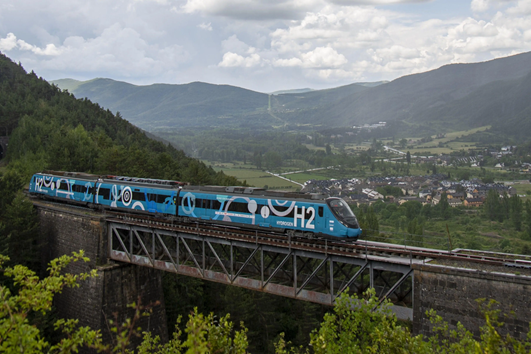The first hydrogen-powered train has been tested on the Spanish and Portuguese rail networks.
The success of the project confirms the commitment to innovation in the development of zero-emission fuel cell and battery hybrid technologies, offering an alternative to compete with diesel trains in the ongoing decarbonization process. The FCH2Rail project was developed by a consortium consisting of CAF, DLR, Toyota, Renfe, Adif, CNH2, IP and Stemmann-Technik, with a budget of €14 million. The final event of the FCH2Rail project was held in conjunction with the RailLive! 2024 conference, which is currently taking place in the city of Zaragoza. Over the last four years, the project has developed a dual-mode demonstration train with hydrogen fuel cells, which has been tested on the Spanish and Portuguese rail networks.
The event began with a presentation of the project’s development process and a detailed review of the main highlights and achievements.Paloma Baena, Renfe’s Director of Global Strategy, Jose Conrado and Iosu Ibarbia, CTOs of Adif and CAF, as well as Emilio Nieto, Director of CNH2, joined together in a panel to discuss the results of the FCH2RAIL project. Afterwards, attendees were given a tour of the hydrogen train and had the opportunity to experience a field test ride on the hydrogen train from the CAF plant in Zaragoza to the Villanueva de Gallego station. The event also featured the presence of Valerie Bouillon-Delporte, Director of the Clean Hydrogen Partnership (CHP), as well as executives from the project’s participating companies and other companies actively supporting the program.
The FCH2RAIL project has a planned four-year lifespan and a budget of more than 14 million euros, of which about 70% is financed by European funds. The project started in January 2021, when the FCH2RAIL proposal was selected by the European Commission’s Facilitation Agency for Hydrogen and Fuel Cell Development, FCH JU (now replaced by the Partnership for Clean Hydrogen). The goal of the project was to develop an innovative hydrogen-powered prototype train, which was successfully achieved by project partners CAF, DLR, RENFE, Toyota Europe, ADIF, IP, CNH2 and FAIVELEY Stemmann Technik.
The so-called Fuel Cell Hybrid PowerPack was developed and manufactured using the PowerPack supplied by Renfe to existing commuter trains. This innovative zero-emission power generation system uses hydrogen fuel cells and LTO batteries to provide electricity to power trains on non-electrified lines and, where available, via overhead power lines. This is the first demonstration train in the Iberian Peninsula to use hydrogen fuel cells.
The first phase of the project (starting in 2021) focuses on developing new power generation solutions and integrating them into the existing traction system. To this end, the fuel cell hybrid PowerPack was first tested outside the vehicle to validate and optimize the functionality of the energy management system. Once the demonstration train was completed, static tests began in 2022 at the CAF plant in Zaragoza, which tested the correct installation and integration of the new system, the interfaces and their proper functioning, as well as hydrogen sealing tests and the first hydrogen powering of the train.
In mid-2022, dynamic testing of the train begins, initially on a closed track to optimize the new systems and equipment, followed by tests on an external track. These tests are aimed at optimizing the mix of fuel cells and batteries, simulating commercial operations on typical routes defined in the project, and testing the performance of the new system under a wide range of power demand conditions.
One of the key milestones of the project is the authorization to carry out tests on the Spanish national rail network and, for the first time, on the Zaragoza-Canfranc route. This marks the first time that Adif has authorized the testing of hydrogen trains on the Spanish national rail network (RFIG), with all the risk analysis and safety validation processes associated with the testing of the new technology having been completed. The train arrived at Canfranc station in the Aragonese Pyrenees, proving the reliability of the technology used. The route from Zaragoza to Canfranc was particularly challenging because of its steep gradients and differences in height, which posed a great challenge for the new on-board power generation system.
In order to test the new technology under a wide range of power and energy demand conditions, the train was then tested on different routes, mainly in the regions of Aragón, Madrid and Galicia. The test scenarios included operation in different climatic and operating conditions. Overall, the prototype has traveled more than 10,000 kilometers in hydrogen mode.
During the train’s stay in Galicia, the project reached another important milestone – the train successfully crossed the border and began testing on the Portuguese route. This provided an opportunity to evaluate the new technology more comprehensively and provided data to support the subsequent evaluation of the hydrogen fuel cell dual-mode hybrid train as a sustainable alternative to existing trains.

